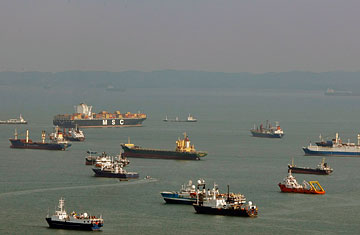
Container ships and bulk carriers are seen off the coast of Singapore on March 10, 2009
Lee's complaint of overwork sounds dissonant during a global recession, but it is precisely because of the plunge in global trade that Lee, who works for a ship-supply company, is clocking up so much overtime. The World Trade Organization predicts the volume of global trade will shrink by 9% in 2009, the worst fall since the Great Depression. As a result, a fleet of empty ships lie idly at anchor just outside the territorial waters of Singapore, the world's busiest port. "The pile up of ships in the Straits is a reflection of the collapse in trade until the early part of this year," says P.K. Basu, Asia economist for the Daiwa Institute of Research. Mirroring that drop is the Baltic Dry Index, which tracks the average cost of shipping a container of goods. It has plummeted more than any stock market, from a peak of 11,000 in mid-2008 to roughly 2,600 today.
Though maritime trade has been picking up recently due to a resumption in Chinese commodity imports, pushing up the Baltic Dry Index from its lows, the Maritime and Port Authority of Singapore estimates there are about 150 ships in the vicinity of the island-state, although the number of vessels could be significantly higher than the official figures. That's in addition to 400 to 500 ships that are using Singapore's port at any given time. Most of the vessels outside Singapore are idle and have been stripped to skeleton crews of three or four in contrast to the normal contingent of 20-25. Nevertheless, they all require the services of companies like Con-Lash Supplies, the firm Lee works for. A one-stop shop for ships sailing through Singapore, it handles the immigration paperwork of oncoming crew, coordinates with ship fuel suppliers and ship repairers, and sells a wide range of goods from coffee to cooking oil to DVDs. "We're at the center of everything," Lee says. (See 10 things to do in Singapore.)
Indeed, the maritime parking lot seems to have been good for business at Con-Lash. "We're getting orders more easily," Tony Ng, its owner, says. He estimates that he's supplying nearly 50% more ships on an average week than he did this time last year. "We've been quite surprised." Ng's firm is one of more than 300 ship chandlers in Singapore, some of them still small mom-and-pop outfits. According to Douglas Inch, who runs the secretariat of the Singapore Ship Suppliers Association, most of them are doing well in spite of the downturn in trade. One reason, he says, is because Singapore is so strategically located along maritime trade routes that it's an ideal place to ride out the recession. "If the ships are going to move anywhere they'll move from here," Inch says. (Read "Laid Off in Singapore.")
Chandlers have prospered since this city became a hub for maritime trade in the early nineteenth century. Before the arrival of the steamship, when three-masted clippers sailed between India and China with cargoes of tea, silver and opium, Singapore was a midway point and a place to drop anchor during the stormy monsoons. Under British colonial rule Singapore developed into a free port where import and export duties were scrapped and passing ships could cheaply purchase all their rigging, provisions, and bunker oil. As the industry grew, the figure of the ship chandler passed into Singapore's literary lore, appearing most memorably in Paul Theroux's 1973 novel Saint Jack, the title character of which is a sly but soft-hearted hustler who sells dreams of romance with female "escorts" along with his sundry goods.
Theroux's hero worked from a cramped Chinese shophouse and muttered darkly about his tight-fisted boss while sweating in a crowded bus to meet his customers. By contrast Ng sits in Con-Lash's spacious, modern offices on the western edge of Singapore where he presides over a 40-person firm with an annual turnover of roughly $17 million. Apart from the toy models of various clipper ships nearby, his office could belong to a stockbroker or management consultant. Gone are the days when he scrambled aboard ships to haggle over the price of eggs or beer. "I can't remember the last time I was on a ship," Ng says. "It's been years."
Below Ng's office is a gymnasium-sized warehouse where he stores the various goods he sells to mariners. Forklifts busily move boxes of soda pop, aspirin, coffee, cooking oil, flour and instant noodles onto waiting trucks, which will take the goods to a security controlled pier. Heightened security around Singapore's port since the Sept. 11, 2001 attacks may have made a chandler's daily routine more regimented and less fun. "In the old days everybody used to knock on the side of the ship and have a beer," Inch recalls. "That's long over." And, as with nearly every industry, the emergence of a handful of big firms like Con-Lash has to an extent curbed the ship chandler's freewheeling spirit.
Even so, Arnold Lee appears to relish the chandler's life. It's the grueling hours he could do without. Describing a recent weekend outing with his family that had to be canceled because of his busy schedule, he looks across the ship-filled sea as the launch chugs back to harbor and sighs, "It's not an easy job." Even so, with the morning sun warm on his face, it's a hard one to give up when you're busy and so many others are not.
